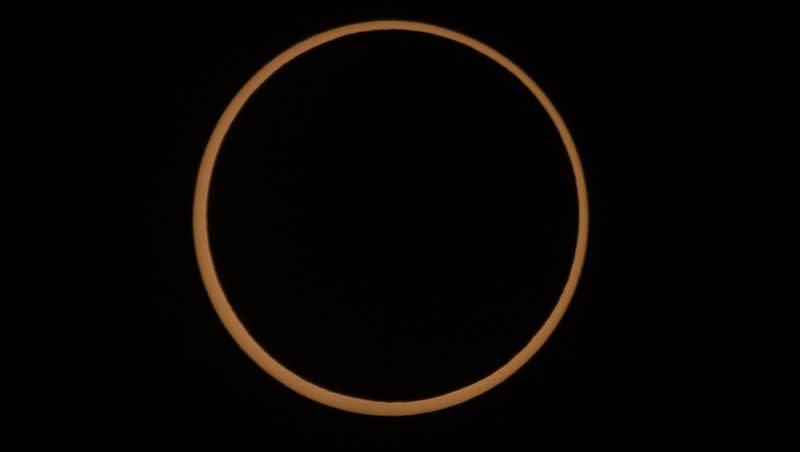That once-in-a-lifetime celestial event? You probably can skip it

- Oops!Something went wrong.Please try again later.
On Saturday morning, residents of Utah and much of the West enjoyed the splendor of the heavens above during an annular solar eclipse.
My family and I stood outside on our back porch at 10:28 a.m., each of us wearing multiple pairs of sunglasses, trying not to burn our retinas as we watched the moon’s shadow partially eclipse the sun.
It was cool and eerie, but only a partial eclipse and nowhere near the sight those in some of our best national parks saw — a true annular eclipse with only a ring of light shining around the perfectly round shadow of the moon.
And as the images of those views emerged across social media, I started to feel that all-too-familiar mom guilt.
Perhaps we should have made the eclipse more of a priority and traveled hours to Canyonlands or Capitol Reef, I thought. Perhaps I had robbed my children of a once-in-a-lifetime memory. Perhaps every other mom in the state had somehow managed to obtain those special eclipse glasses and not piled three pairs of sunglasses on their children’s faces so their kids could actually enjoy this once-in-a-lifetime event.
Related
But then I remembered I have experienced MANY of these once-in-a-lifetime celestial events in my not-short but also not-that-long lifetime. I have seen at least three thus far, the first being when I was in elementary school — the extent to which we discussed the eclipse before it happened was our teacher telling us, “Try not to look at the sun.” Obviously, none of us listened, because we were 8, and we all looked directly at the sun and couldn’t see for the rest of the day, which made reading and math that afternoon difficult.
The second eclipse I remember was in 2017, and it was remarkable because our president at the time, Donald Trump, looked directly at the eclipse just like second grade me.
If it’s not an eclipse, it’s a meteor shower or a blood moon or Jupiter in orbit. Big Space has done a phenomenal job convincing the American public, most of whom know nothing about astronomy, that everything that happens up there only happens once every 500 years.
Their marketing is second only to NBC’s “Must See TV” in the ’90s, but NBC’s claim that its Thursday night lineup was not to be missed was actually more true than these so-called once-in-a-lifetime celestial events. Streaming did not exist at that time and the only way to watch a show after it aired was if you had enough foresight to record it. And no one actually knew how to program their VCRs to do that and even if they did, the chances that this VCR genius would actually remember to hit record were slim. So really, the only opportunity to see “Frasier” was indeed on Thursday night. If you missed the one where Niles confesses his love to Daphne, you were just out of luck.
If you miss an eclipse, however, there will be another spectacular sky show next week. And it will be lovely and awe-inspiring and you will be glad you saw it, but if you miss it, it will be completely fine because there will be a meteor shower the week after. There’s a total eclipse expected just next year.
So the next time it’s the day before a celestial event and you’re hearing about it hours before it happens, and you 1) Don’t know where to get the special glasses that save you from the fate my entire second grade class and Donald Trump suffered, and 2) Panic because everyone you know is driving to a remote location to view the event in its fullest splendor and you’re starting to wonder if you should, too — remember that this is not the final celestial event of your lifetime unless you’re like 102. In that case, it may be.
But for the rest of us, in all likelihood, there will be plenty more eclipses and meteor showers and times when Jupiter is in orbit or the International Space Station passes overhead. And we can plan entire weekends around driving to the best vantage spot, or we can watch from the back porch, or we can completely forget to watch at all, or decide to watch “Frasier” instead, and it will be totally fine. Don’t be gaslit into believing it won’t.

